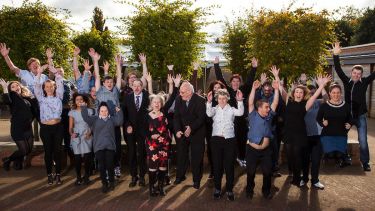A Self-advocacy response from South Yorkshire
by Speakup Self-advocacy Rotherham, UK

The effect of the situation on the organisation and its staff
Speakup had a rapid response to the government’s instruction to stay at home. The day this instruction happened, Speakup people with learning disabilities, autism or both had been working on a social distancing policy to keep people as safe as possible. Because of this, the group were already thinking about alternative ways of working.
Our services have had to radically change. First of all, we got in contact with our local council, Voluntary Action Rotherham and Community Catalyst, to make sure that our response was co-ordinated with theirs. We then asked our media engineer, who works with us to create accessible information and films, to set up Zoom meetings for us – which we have been holding daily. Our workers responsible for keeping Speakup on target are meeting at 9:00am, via Zoom, to plan the day. At 11:00am, we have a Zoom meeting that is open to all from Speakup, so that people can chat together, talk about their anxieties and frustrations, but also talk about any positive things that happened the day before. The meetings have been lively, challenging and fun.
Other than 2 self advocates we have needed to furlough, one being our caretaker and the other who unfortunately doesn’t have support to work from home, we have managed to keep all workers with learning disabilities and autism employed and created two further sessional positions.
Other workers without learning disabilities are overwhelmed with work but are managing this from home. Speakup is always incredibly busy and, because of heightened anxieties, the phones never stop. We have managed to get some of the Covid-19 funding, so the organisation is stable at present. However, after Christmas we drop out badly and we are very worried that funding pots at this time might be overwhelmed. We apply for funding weekly and this is a continuation of the ‘norm’.
The effect of the situation on the people we support
Our communities of interest are people with learning disabilities, autism or both, many of whom have enduring mental health conditions. The current ‘lockdown’ is causing people’s anxieties and levels of crisis to increase significantly.
Strategies and activities that have been implemented to mitigate the effects of 1&2
Due to COVID-19, our team of peer supporters have increased their support time to individuals out in the community. They are providing crisis support and one to one support with mental health and wellbeing through:
- Daily group ZOOM calls which act as a virtual Advocacy Group for people
- Daily one to one sessions with individuals to listen, advise and provide additional support to vulnerable people who are isolated and are experiencing increased anxiety and depression at this time
- Weekly recurring planned group support sessions in the form of quizzes, mindfulness, massage, yoga, talking therapy, cooking and life skills which people can join – run by self-advocates
All these activities need continuity and sustainability, so that a best practice firm foundation is built – and as a legacy for the future, given the potential for the long lasting nature of this crisis.
- What have you done differently? (descriptive)
Speakup has moved from a permanent large office space to remote working from home. Group work and one-to-one work is continuing, but via Zoom meetings or phone calls. This has worked surprisingly well and, for some of our members, gives them a structured time and ‘place’ in which to meet. For all the people involved in these activities, it has lessened social isolation and the only negative is when tensions rise and people fall out.
- What did you learn? (reflective)
We have learned that we can diversify in ways that we never thought possible. The success of Zoom has been surprising and we will certainly continue Zoom methods of working when normal working patterns resume. We feel that genuine friendships have been made, which would not have happened had we continued our normal way of working. The social activities have also been really interesting to observe and fun for everyone involved.
- What has gone wrong?
Because of heighted anxieties and group tensions, there are the occasional days that don’t go well; people may argue and occasionally fall out with others on the Zoom calls, quiz or WhatsApp. Generally, these have been resolved by private conversations between the aggrieved people concerned in the disagreement. At other times it has taken some mediation with an inclusion worker to sort things out.
Shielding issues
There are no issues at present; most people have some support. Speakup has had to deliver food to two people, but only on one occasion each. At other times, support circles have been available.

iHuman
How we understand being ‘human’ differs between disciplines and has changed radically over time. We are living in an age marked by rapid growth in knowledge about the human body and brain, and new technologies with the potential to change them.
